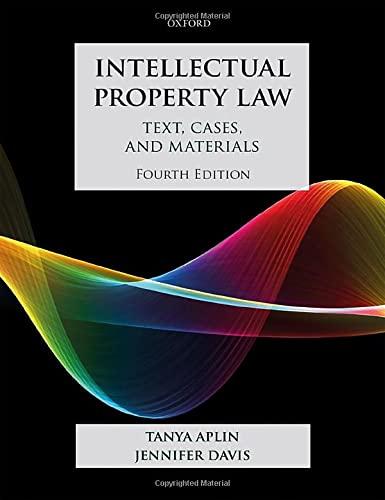Question
Lawyer Fights $10 Million Fee For Cosmetic Johnson And Johnson Settlement https://www.forbes.com/sites/danielfisher/2012/09/04/lawyer-fights-10-million-fee-for-cosmetic-johnson-johnson-settlement/?sh=43c691336c23 -Choose a chapter that we have reviewed that you have an interest. Then
Lawyer Fights $10 Million Fee For "Cosmetic" Johnson And Johnson Settlement
https://www.forbes.com/sites/danielfisher/2012/09/04/lawyer-fights-10-million-fee-for-cosmetic-johnson-johnson-settlement/?sh=43c691336c23
-Choose a chapter that we have reviewed that you have an interest. Then choose a legal topic within that chapter.Once you have chosen the legal topic, find an articleof a currentevent as reported in written media (not blogs, etc.) thatrelates to business and the law, and specifically to the legal topic you have chosen.This assignment requires a written summary- not a copy and paste - of a current event as reported in written media (not blogs, etc.) that relates to the law andmust include a complete description of the facts, the law and the outcome of the case and how the legal topic you have chosen relates to the article.As a guide, make sure you cover the "who, what, where and when" of the event as reported.
Your summary must be paragraph form with proper grammar, spelling and punctuation. It must be at least 500 words.
-You must include a complete citation of the source
TOPIC I CHOSE: WHO PAY AN ATTORNEY'S FEE?
Example: (THIS IS ANOTHER TOPIC/ BASE ON THIS EXAMPLE TO SUMMARY)
Hello Students,
The following is an example for you to read to get an idea of the requirements set forth in the syllabus. This example was submitted by a student in a previous Business Law I course.
You may not use this case for your legal topic summary.
If you have any questions, please post them.
Professor Keiner
Business Law I
I was assigned Chapter Four to choose my topic from and I have chosen to discuss commercial speech as a form of speech protected under the First Amendment. Commercial Speech is fairly explanatory in that it includes communications involving advertising and marketing that are made by businesses regarding their specific interests.So in other words, it is the right to freedom of speech with your business entity. Though its protection under the First Amendment is not as extensive as other forms of speech, it is still an interesting concept where in some predicaments state legislations are able to have their own levels of protection and prevention when it comes to Commercial Speech. A restriction of commercial speech must meet the criteria of seeking an implement of substantial government interest, directly advance that interest, and go no further than that to accomplish the objective.
A case that highlights Commercial Speech[INSERT THE NAME OF THE CASE], as discussed above, recently occurredin the state of New York. The case took place in early 2017 and was disputed between five business entities led by Expressions Hair Design against the attorney general of New York,Eric T. Schneiderman. The initial concern came addressed the lack of detail regarding the New York General Business Law prohibitingsurcharges on credit card transactions. The plaintiffs alleged that this prohibition of credit card surcharges regulated communication of prices, therefore it regulated the commercial speech.
The reason for the dispute was a claim from the plaintiff's end stating " that the statute violated the Free Speech Clause of the First Amendment and that the statute was unconstitutionally vague under the Due Process Clause of the Fourteenth Amendment." They claimed vagueness in this law because it fails to differentiate "discounts", a permissibleaction, and"surcharges",one that is prohibitedtherefore causing confusion. In other words they felt that the state is regulating the way that their businesses communicate certain price schemes to customers, infringing on their freedom of commercial speech. However, the court deemed this application of the First Amendment invalid because it is simply an economic regulation not a restriction of commercial speech as they are still allowed to charge differently between cash and card transactions, they just cannot label the difference as a card surcharge. This gets very technical because this prohibition pretty much keeps businesses from mentioning a surcharge in their pricing, but it does not prohibit these businesses from having different prices in cash and credit card transactions, still enabling businesses to offer a "cash discount". In conclusion, this attempt of using Commercial Speech as an unjust restriction on a small business' ability to use surcharges for credit cards was unsuccessful however it was a very interestingread because there was definitely some truth with backing in the plaintiff's claims and arguments
Bibliography:
Step by Step Solution
There are 3 Steps involved in it
Step: 1

Get Instant Access to Expert-Tailored Solutions
See step-by-step solutions with expert insights and AI powered tools for academic success
Step: 2

Step: 3

Ace Your Homework with AI
Get the answers you need in no time with our AI-driven, step-by-step assistance
Get Started


